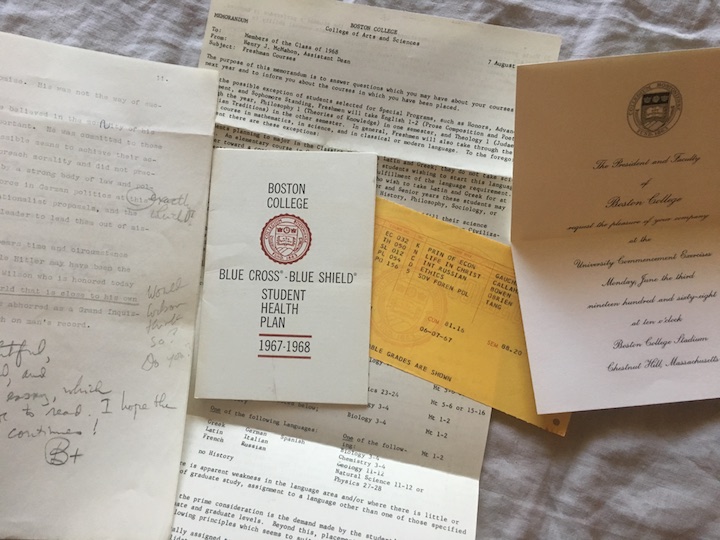An important, if somewhat downplayed, aspect of our 50th reunion is that we represent history. Having graduated from BC 50 years ago, we have knowledge and memories others don’t. Many of us also have “stuff” from back then, and some of that stuff is of interest and value to the University.
BC has a collection in the University Archives called “Boston College alumni papers.” It serves as documentation of the student experience at BC through the years and contains items collected or created by students from as far back as the Class of 1871. The materials in the collection include
- autograph books
- correspondence
- course notebooks
- drawings
- ephemera (invitations, programs, buttons, etc.)
- interviews
- medals
- needlepoint
- newspaper clippings
- scrapbooks
- speeches
- student papers
- photographs
- poems
Do you have any of these from our years at BC? (Don’t worry, any charges of hoarding or obsession have long passed the statute of limitations.)
At this time, I’m the only member of the class to have items in the collection. Just as examples of the kinds of things in which Archives is interested, I submitted my original application to BC as well as a term paper annotated by John McAleer, professor of English. I plan to offer additional material. (I’m not a hoarder, I’m a antiquarian.)
Here is additional guidance from BC Head Archivist Amy Braitsch:
“The University Archives at the Burns Library seeks to add material that documents student life and the history of Boston College in a way that is useful to researchers (current students, faculty, and staff alike, as well as visiting scholars) and can be preserved by the archives for many years to come.
“So that you have a few guidelines as you work through material, we generally hold all the copies of Sub Turri, The Stylus, The Heights, and the BC Catalogue as we can take; please keep those for your family to enjoy. Bulky items like printing plates and textiles are difficult for us to accommodate. We do accept photographs and photo albums in good condition (particularly with some identification or dates), personal accounts (diaries, letters, memoirs), and ephemera (tickets, pins, dance cards, invitations). It is less common, but we can work with researchers who hold recorded audio and moving image material.”
Amy suggests contacting The Burns Library to provide information about the material you would like to donate. The John J. Burns Library, located at the north end of Bapst Library, holds the University’s “special collections,” including the University Archives,

